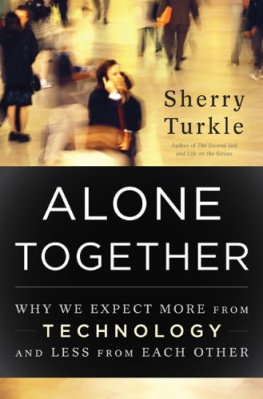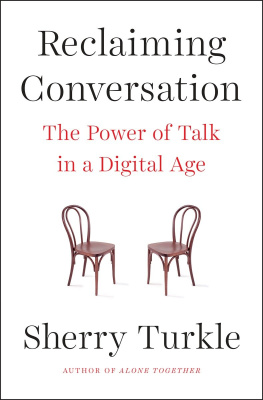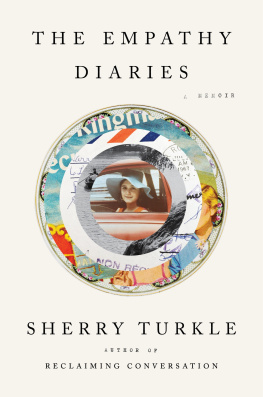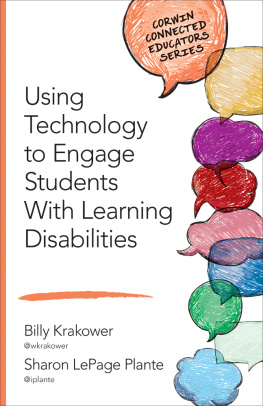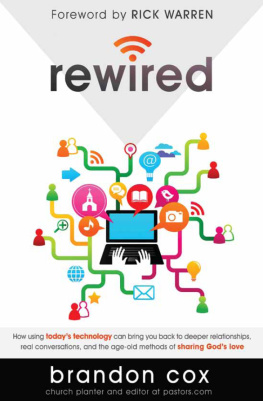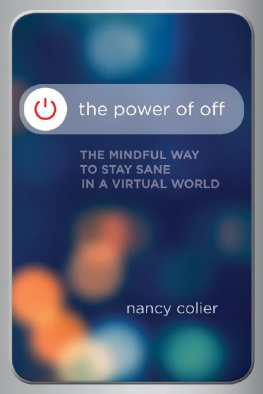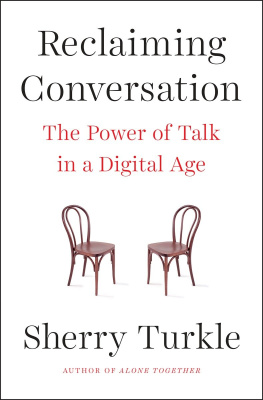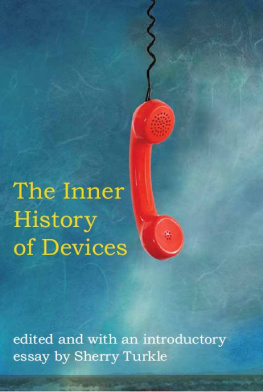Table of Contents
ALSO BY SHERRY TURKLE
Psychoanalytic Politics
The Second Self
Life on the Screen
Evocative Objects (Ed.)
Falling for Science (Ed.)
The Inner History of Devices (Ed.)
Simulation and Its Discontents
TO REBECCA
My letter to you, with love
Everything that deceives may be said to enchant.
Plato, The Republic
Im done with smart machines. I want a machine thats attentive to my needs. Where are the sensitive machines?
Tweet available at dig_natRT @tigoe via @ramonapringle
AUTHORS NOTE
Turning points
T hirty years ago, when I joined the faculty at MIT to study computer culture, the world retained a certain innocence. Children played tic-tac-toe with their electronic toys, video game missiles took on invading asteroids, and intelligent programs could hold up their end of a serious chess match. The first home computers were being bought by people called hobbyists. The people who bought or built them experimented with programming, often making their own simple games. No one knew to what further uses home computers might be put. The intellectual buzz in the still-young field of artificial intelligence was over programs that could recognize simple shapes and manipulate blocks. AI scientists debated whether machines of the future would have their smarts programmed into them or whether intelligence might emerge from simple instructions written into machine hardware, just as neurobiologists currently imagine that intelligence and reflective self-consciousness emerge from the relatively simple architecture and activity of the human brain.
Now I was among them and, like any anthropologist, something of a stranger in a strange land. I had just spent several years in Paris studying how psychoanalytic ideas had spread into everyday life in Francehow people were picking up and trying on this new language for thinking about the self. I had come to MIT because I sensed that something similar was happening with the language of computers. Computational metaphors, such as debugging and programming, were starting to be used to think about politics, education, social life, andmost central to the analogy with psychoanalysisabout the self. While my computer science colleagues were immersed in getting computers to do ingenious things, I had other concerns. How were computers changing us as people? My colleagues often objected, insisting that computers were just tools. But I was certain that the just in that sentence was deceiving. We are shaped by our tools. And now, the computer, a machine on the border of becoming a mind, was changing and shaping us.
As a psychoanalytically trained psychologist, I wanted to explore what I have called the inner history of devices. Discovering an inner history requires listeningand often not to the first story told. Much is learned from the tossed-off aside, the comment made when the interview is officially over. To do my work, I adopted an ethnographic and clinical style of research as I lived in worlds new to me. But instead of spending hundreds of hours in simple dwellings, as an anthropologist in a traditional setting would do, listening to the local lore, I lurked around computer science departments, home computer hobbyist clubs, and junior high school computer laboratories. I asked questions of scientists, home computer owners, and children, but mostly I listened to how they talked and watched how they behaved among their new thinking machines.
I heard computers provoke erudite conversations. Perhaps, people wondered, the human mind is just a programmed machine, much like a computer. Perhaps if the mind is a program, free will is an illusion. Most strikingly, these conversations occurred not just in seminar rooms. They were taking place around kitchen tables and in playrooms. Computers brought philosophy into everyday life; in particular, they turned children into philosophers. In the presence of their simple electronic gamesgames that played tic-tac-toe or challenged them in spellingchildren asked if computers were alive, if they had different ways of thinking from people, and what, in the age of smart machines, was special about being a person.
In the late 1970s and early 1980s, I witnessed a moment when we were confronted with machines that invited us to think differently about human thought, memory, and understanding. The computer was an evocative object that provoked self-reflection. For me, this was captured in a conversation I had with thirteen-year-old Deborah in the early 1980s. After a year of studying programming, Deborah said that, when working with the computer, theres a little piece of your mind and now its a little piece of the computers mind. Once this was achieved, you could see yourself differently. Face-to-face with a computer, people reflected on who they were in the mirror of the machine. In 1984, thinking about Deborah (and in homage as well to Simone de Beauvoir), I called my first book on computers and people The Second Self.
That date, 1984, is of course iconic in Western intellectual thinking, tethered as it is to George Orwells novel. Nineteen Eighty-Four describes a society that subjects people to constant government surveillance, public mind control, and loss of individual rights. I find it ironic that my own 1984 book, about the technology that in many a science fiction novel makes possible such a dystopian world, was by contrast full of hope and optimism. I had concerns about the holding power of the new technology: some people found computers so compelling that they did not want to be separated from them. And I worried whether losing oneself in worlds within the machine would distract us from facing our problems in the realboth personal and political. But, in this first work, I focused on how evocative computers fostered new reflection about the self.
In the decade following the publication of The Second Self , peoples relationships with computers changed. Whereas in the 1980s that relationship was almost always one-on-one, a person alone with a machine, in the 1990s, this was no longer the case. By then, the computer had become a portal that enabled people to lead parallel lives in virtual worlds. People joined networks such as America Online and discovered a new sense of place. These were heady times: we were no longer limited to handfuls of close friends and contacts. Now we could have hundreds, even thousands, a dazzling breadth of connection. My focus shifted from the one-on-one with a computer to the relationships people formed with each other using the computer as an intermediary.
I began throwing weekly pizza parties in the Boston area to meet people who could tell me the stories of their lives in the new virtual worlds. They described the erosion of boundaries between the real and virtual as they moved in and out of their lives on the screen. Views of self became less unitary, more protean. I again felt witness, through the prism of technology, to a shift in how we create and experience our own identities.
I reported on this work in my 1995 Life on the Screen , which offered, on balance, a positive view of new opportunities for exploring identity online. But by then, my optimism of 1984 had been challenged. I was meeting people, many people, who found online life more satisfying than what some derisively called RL, that is, real life. Doug, a Midwestern college student, played four avatars, distributed across three different online worlds. He always had these worlds open as windows on his computer screen along with his schoolwork, e-mail program, and favorite games. He cycled easily through them. He told me that RL is just one more window. And, he added, its not usually my best one. Where was this leading?
Two avenues forward became apparent by the mid-1990s. The first was the development of a fully networked life. Access to the network no longer required that we know our destination. With browsers and search enginesMosaic, Netscape, Internet Explorer, Googleone had the sense of traversing an infinite landscape always there to be discovered. And as connections to the Internet went mobile, we no longer logged on from a desktop, tethered by cables to an object called a computer. The network was with us, on us, all the time. So, we could be with each other all the time. Second, there was an evolution in robotics. Now, instead of simply taking on difficult or dangerous jobs for us, robots would try to be our friends. The fruits of such research made their way into childrens playrooms: by the late 1990s, children were presented with digital creatures that made demands for attention and seemed to pay attention to them.
Next page
